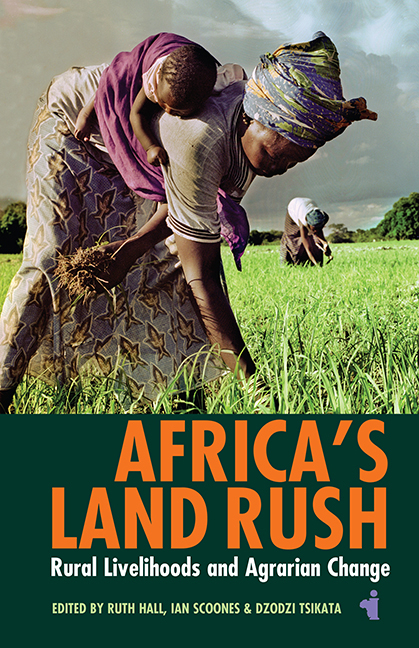Book contents
- Frontmatter
- Contents
- List of Maps, Tables & Figures
- Notes on Contributors
- Preface
- Acknowledgements
- List of Abbreviations
- 1 Introduction: The Contexts & Consequences of Africa’s Land Rush
- 2 State, Land & Agricultural Commercialisation in Kwara State, Nigeria
- 3 Recent Transnational Land Deals & the Local Agrarian Economy in Ghana
- 4 Large-Scale Land Acquisitions in Ethiopia: Implications for Agricultural Transformation & Livelihood Security
- 5 Land Deals & Pastoralist Livelihoods in Laikipia County, Kenya
- 6 Land Deals in the Tana Delta, Kenya
- 7 The State & Foreign Capital in Agricultural Commercialisation: The Case of Tanzania’s Kilombero Sugar Company
- 8 Trapped between the Farm Input Subsidy Programme & the Green Belt Initiative: Malawi’s Contemporary Agrarian Political Economy
- 9 Agrarian Struggles in Mozambique: Insights from Sugarcane Plantations
- 10 South African Commercial Farmers in the Congo
- References
- Index
7 - The State &Foreign Capital in Agricultural Commercialisation: The Case of Tanzania’s Kilombero Sugar Company
Published online by Cambridge University Press: 21 May 2021
- Frontmatter
- Contents
- List of Maps, Tables & Figures
- Notes on Contributors
- Preface
- Acknowledgements
- List of Abbreviations
- 1 Introduction: The Contexts & Consequences of Africa’s Land Rush
- 2 State, Land & Agricultural Commercialisation in Kwara State, Nigeria
- 3 Recent Transnational Land Deals & the Local Agrarian Economy in Ghana
- 4 Large-Scale Land Acquisitions in Ethiopia: Implications for Agricultural Transformation & Livelihood Security
- 5 Land Deals & Pastoralist Livelihoods in Laikipia County, Kenya
- 6 Land Deals in the Tana Delta, Kenya
- 7 The State & Foreign Capital in Agricultural Commercialisation: The Case of Tanzania’s Kilombero Sugar Company
- 8 Trapped between the Farm Input Subsidy Programme & the Green Belt Initiative: Malawi’s Contemporary Agrarian Political Economy
- 9 Agrarian Struggles in Mozambique: Insights from Sugarcane Plantations
- 10 South African Commercial Farmers in the Congo
- References
- Index
Summary
Introduction
As we walk from the village through the cane fields, several exhausted cane-cutters, carrying their pangas, trudge past in rubber boots. In an outgrower's field, the owner stands with a man holding a clipboard and two field workers, while a small yellow loader picks up bundles of burnt sugarcane and piles them on to a truck. A second truck, already half filled, sits stranded by a broken drive shaft. The owner says he is relieved to have harvested 35 tonnes in dry weather, but must still harvest the rest of his cane and then prepare his fields for the next season.
This is the sugar business in Kilombero in south-eastern Tanzania, where industrial agriculture has squeezed itself into a strip of fertile land between high mountains and protected parks and bushland. Once, villagers cleared that bushland to grow rice paddy; now it is contracted cane that dominates the landscape. Since the first sugar mill was established here 50 years ago, there has been constant development and change in outgrower operations. Now, at a time of renewed interest in Tanzanian agriculture as an investment destination, we looked to Kilombero for useful lessons and, as we show in this chapter, found dynamics of differentiation, accumulation and grievance that signal the likelihood of further contestation and change in the future.
Sugar has emerged as one of Southern Africa's most significant commodities, with profound economic, environmental, political and social effects. The region is undergoing a sugar boom, and Tanzania intends to become an important player. In 2012, the Tanzanian government announced plans to develop three to five new large sugar projects and earmarked a number of potential sites for their development (SAGCOT 2012). In 2013, plans were released for a further fifteen commercial deals in sugarcane farming (URT 2013: 18). According to our calculations, the sugarcane estates from those fifteen deals would, if implemented as planned, cover a total area of 329,900ha.
These ambitious sugar plans form part of several initiatives by the government of Tanzania to encourage foreign direct investment in agriculture. Under the ‘Kilimo Kwanza’ (meaning ‘agriculture first’) strategy, it intends to establish large-scale plantations, ranging between 20,000 and 50,000ha, alongside smallholder schemes with irrigation and supporting transportation and marketing infrastructure.
- Type
- Chapter
- Information
- Africa's Land RushRural Livelihoods and Agrarian Change, pp. 114 - 131Publisher: Boydell & BrewerPrint publication year: 2015
- 4
- Cited by



